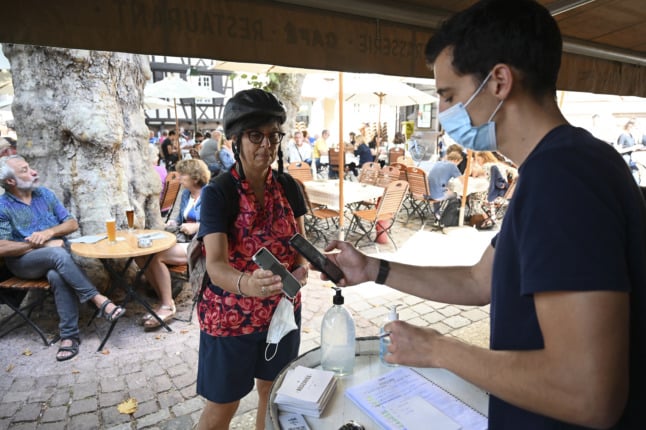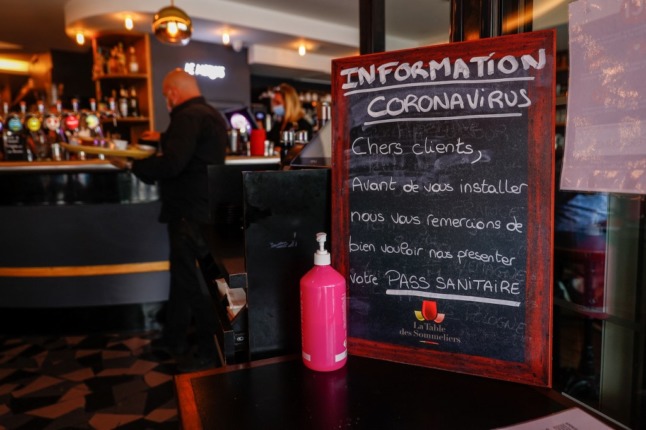At Le Valmy bar and café by Paris’ Canal Saint-Martin, around a dozen people were sitting and drinking coffee at 11am on Monday.
Similar to any other weekday morning, then, expect for a slight difference – a sign on the door informed clients they needed to show a health pass. When a staff member came to take their order, clients were then asked to show their TousAntiCovid app or paper certificate confirming that they are either fully vaccinated, have recently tested negative for Covid or recently recovered from Covid.
According to bartender Matthieu, only half of the people who arrived on Monday morning knew they needed a pass.
“The vast majority understand and accept it without a problem,” said Matthieu, who added that he’d only had to turn away two clients. “I think they only had their first dose, so we had to tell them, you can order to go, but you can’t sit in.”
Marie-Soisick, 56, barely noticed the change, since she has been showing her health pass in theatres and concerts for the past three weeks, but she said she didn’t understand why she needed to show the pass for drinking a coffee outside.
“It’s the incoherence between the different measures, where we’re asked for a pass outside on a terrace, but we’re not asked for it on the metro, the RER or certain trains.”
EXPLAINED: How France’s health pass works from Monday
Marie-Soisick always carries a paper copy of her vaccine certificate. “I refuse to use the app, I’d rather protect my personal data,” she said.
American Madeleine, 28, who lives in Lyon, and Nell, 30, visiting from New York, were sitting on the terrace with their suitcases having just arrived in the capital.
Madeleine had warned her childhood friend that they would need to show a health pass during their visit, and the bar accepted Nell’s American vaccination pass, which doesn’t have a QR code.
“As long as I see an official paper which proves the person is vaccinated, it’s okay,” Matthieu said [although this may not be the case in all venues, guidelines state that US vaccine certificates should be converted to French ones – here’s how].
Having already had to show her vaccination card in certain venues in New York, Nell was prepared. “It doesn’t bother me, the problem is I only have one and I’m really scared of losing it,” she said. “Having to carry it around in a foreign country and the risk of losing it – that’s actually a bigger problem to me than the concept of being asked if I have the vaccine.”
READ ALSO Can tourists use France’s health passport to access museums, cafés and trains?
While she understands why people are opposed to the pass, Madeleine said she is in favour of the policy. “I think it would only be a problem if the vaccine wasn’t available to everyone, but now that it’s available, I have to admit I have little sympathy for people who don’t want to get vaccinated.”
“You relinquish your social privileges if you are not willing to abide by the social contract that keeps everybody else safe,” Nell agreed.
“I was surprised that everyone had [the pass],” said Omaima at the Peace and Love bar further up the canal, who was nonetheless worried about having to check passes once more people started arriving. “With the clients who are used to coming here, I think it’s going to be difficult to explain to them.”
The bar is attached to a youth hostel, meaning most of the people drinking a coffee on Monday morning were tourists. “I have had problems scanning the codes of people who don’t come from Europe,” Omaima said. “It doesn’t work with them, so they just need to show their vaccination card.”
READ ALSO Everything tourists need to know about Covid rules and requirements in France
Others are firmly against the new policy, but are resigned to the situation.
“I think it’s terrible as a restaurateur, firstly to have to have to play the role of the police, which isn’t our job, and then I think it’s terrible for the economy,” said Sarah*, manager of a brasserie in the 19th arrondissement in northern Paris.
The restaurant had already begun asking clients to show a health pass on Monday morning – after a week-long grace period, restaurant owners risk fines and having their businesses temporarily shut down if they do not respect the new rules. “I’m sad to have to do that,” Sarah said.
People who are not yet vaccinated can access health pass venues by presenting proof they have recovered from Covid, or a recent negative test, and pharmacies fear they won’t be able to cope with the demand for tests. Tests were originally supposed to be valid for 48 hours, but now they only need to have been taken within the previous 72 hours.
Outside a pop-up testing centre in the 19th arrondissement on Monday, Filip Babic, 22, and his friend were calculating how long the negative status would last. After considering the maths, Filip decided to take a test.
“I have to take a train to go to Marseille and I also have to eat with my friend. Otherwise I wouldn’t have done it, it’s just because I have the train so it kills two birds with one stone, and since it’s been prolonged to 72 hours, I thought why not do it now, since I’ll be leaving on Thursday.”
Premier contrôle du #PassSanitaire à la Gare de Lyon avant accès au TGV.
Les agents accrochent des bracelets bleus au poignet des personnes après le contrôle du pass. #GareDeLyon pic.twitter.com/WUVmq8eGOp
— Remy Buisine (@RemyBuisine) August 9, 2021
As well as bars and cafés, the health pass is also now required on TGV, Intercité, and night trains. As seen in the above video, staff at train stations were fitting passengers with blue bracelets on Monday after checking their health pass.
Filip often used to go to bars and restaurants, but since he’s yet to receive the vaccine, he says “that’s going to change a lot of things”.
“Getting vaccinated doesn’t bother me, it’s more about the obligation to get vaccinated. I’m not in favour of that,” he added.
The health pass has already been needed to go to the cinema, visit a museum, or visit any culture or leisure venue hosting more than 50 people since July 21st.
Alice, a projectionist at a Paris cinema, has therefore already seen the first effects of the passport. “There are visibly fewer people than usual,” she said.
However, Alice believes extending the validity of negative tests to 72 hours will have a positive effect. “Doing a test to see one or two films – you might ask yourself whether it’s worth it. But if you have three days to watch films, maybe it is.”
Many business owners fear it will be complicated to turn people away if they do not have a valid pass. “They don’t have the health pass and there is nothing I can do,” Mirela Mihalca, a waiter in a café in central Paris told AFP, pointing to two customers who had sat down but whom she had refused to serve. “Some understand it quickly, others not. It is going to be difficult, we are not the police!”
David Fourton, manager of a city-centre café in Bordeaux, told AFP the new rules would mean having to hire an extra person to carry out the checks. “And if we turn clients away what is there reaction going to be? It will slow things down for sure and risks being an utter mess at busy times.”



 Please whitelist us to continue reading.
Please whitelist us to continue reading.
Member comments